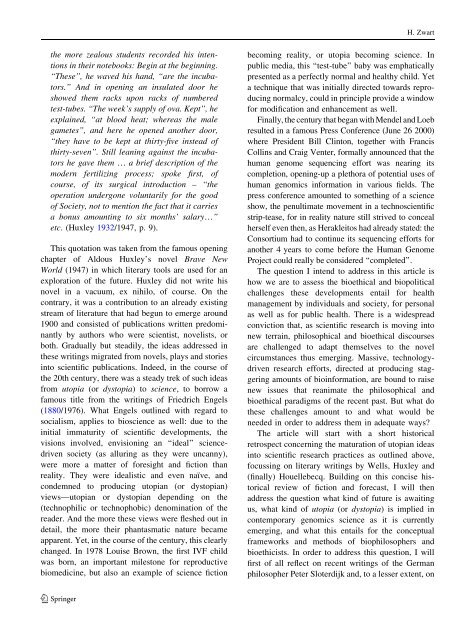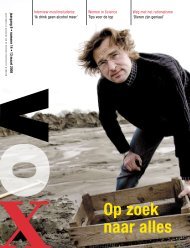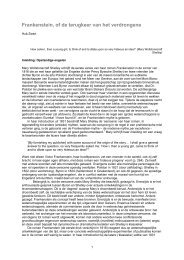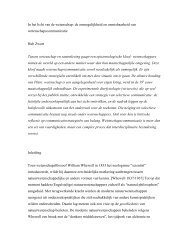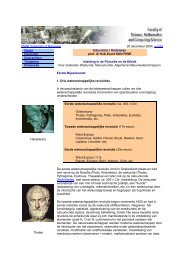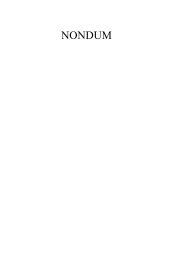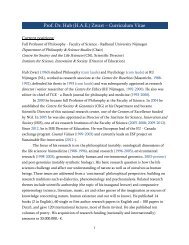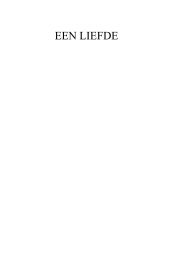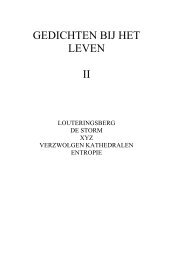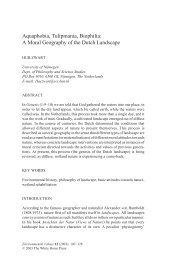Download - Hub Zwart
Download - Hub Zwart
Download - Hub Zwart
- No tags were found...
You also want an ePaper? Increase the reach of your titles
YUMPU automatically turns print PDFs into web optimized ePapers that Google loves.
H. <strong>Zwart</strong>the more zealous students recorded his intentionsin their notebooks: Begin at the beginning.‘‘These’’, he waved his hand, ‘‘are the incubators.’’And in opening an insulated door heshowed them racks upon racks of numberedtest-tubes. ‘‘The week’s supply of ova. Kept’’, heexplained, ‘‘at blood heat; whereas the malegametes’’, and here he opened another door,‘‘they have to be kept at thirty-five instead ofthirty-seven’’. Still leaning against the incubatorshe gave them … a brief description of themodern fertilizing process; spoke first, ofcourse, of its surgical introduction – ‘‘theoperation undergone voluntarily for the goodof Society, not to mention the fact that it carriesa bonus amounting to six months’ salary…’’etc. (Huxley 1932/1947, p. 9).This quotation was taken from the famous openingchapter of Aldous Huxley’s novel Brave NewWorld (1947) in which literary tools are used for anexploration of the future. Huxley did not write hisnovel in a vacuum, ex nihilo, of course. On thecontrary, it was a contribution to an already existingstream of literature that had begun to emerge around1900 and consisted of publications written predominantlyby authors who were scientist, novelists, orboth. Gradually but steadily, the ideas addressed inthese writings migrated from novels, plays and storiesinto scientific publications. Indeed, in the course ofthe 20th century, there was a steady trek of such ideasfrom utopia (or dystopia) to science, to borrow afamous title from the writings of Friedrich Engels(1880/1976). What Engels outlined with regard tosocialism, applies to bioscience as well: due to theinitial immaturity of scientific developments, thevisions involved, envisioning an ‘‘ideal’’ sciencedrivensociety (as alluring as they were uncanny),were more a matter of foresight and fiction thanreality. They were idealistic and even naïve, andcondemned to producing utopian (or dystopian)views—utopian or dystopian depending on the(technophilic or technophobic) denomination of thereader. And the more these views were fleshed out indetail, the more their phantasmatic nature becameapparent. Yet, in the course of the century, this clearlychanged. In 1978 Louise Brown, the first IVF childwas born, an important milestone for reproductivebiomedicine, but also an example of science fictionbecoming reality, or utopia becoming science. Inpublic media, this ‘‘test-tube’’ baby was emphaticallypresented as a perfectly normal and healthy child. Yeta technique that was initially directed towards reproducingnormalcy, could in principle provide a windowfor modification and enhancement as well.Finally, the century that began with Mendel and Loebresulted in a famous Press Conference (June 26 2000)where President Bill Clinton, together with FrancisCollins and Craig Venter, formally announced that thehuman genome sequencing effort was nearing itscompletion, opening-up a plethora of potential uses ofhuman genomics information in various fields. Thepress conference amounted to something of a scienceshow, the penultimate movement in a technoscientificstrip-tease, for in reality nature still strived to concealherself even then, as Herakleitos had already stated: theConsortium had to continue its sequencing efforts foranother 4 years to come before the Human GenomeProject could really be considered ‘‘completed’’.The question I intend to address in this article ishow we are to assess the bioethical and biopoliticalchallenges these developments entail for healthmanagement by individuals and society, for personalas well as for public health. There is a widespreadconviction that, as scientific research is moving intonew terrain, philosophical and bioethical discoursesare challenged to adapt themselves to the novelcircumstances thus emerging. Massive, technologydrivenresearch efforts, directed at producing staggeringamounts of bioinformation, are bound to raisenew issues that reanimate the philosophical andbioethical paradigms of the recent past. But what dothese challenges amount to and what would beneeded in order to address them in adequate ways?The article will start with a short historicalretrospect concerning the maturation of utopian ideasinto scientific research practices as outlined above,focussing on literary writings by Wells, Huxley and(finally) Houellebecq. Building on this concise historicalreview of fiction and forecast, I will thenaddress the question what kind of future is awaitingus, what kind of utopia (or dystopia) is implied incontemporary genomics science as it is currentlyemerging, and what this entails for the conceptualframeworks and methods of biophilosophers andbioethicists. In order to address this question, I willfirst of all reflect on recent writings of the Germanphilosopher Peter Sloterdijk and, to a lesser extent, on123


